If you recently moved to another area where your pooch can finally run free in their yard, kudos! However, you will need to consider one crucial thing – a dog fence!
It’s an absolute must for many dog owners who put the safety of their canines as a priority.
A dog fence will allow your pup to run freely in their territory but give you a sound mind.
What makes choosing a proper dog fence so tricky is that there are so many types of dog fences you can choose from!
Additionally, you will have to pick the best one for your dog’s temperament.
It’s time to build the best energy outlet for your furry friend, and here are your options!
Table of Contents
Types of Dog Fences
Choosing a proper dog fence will depend not only on its price but also on material, quality built, purpose, property size, and dog behavior.
With that in mind, these are all of the types of dog fences you can choose from!
1. Electric Fence
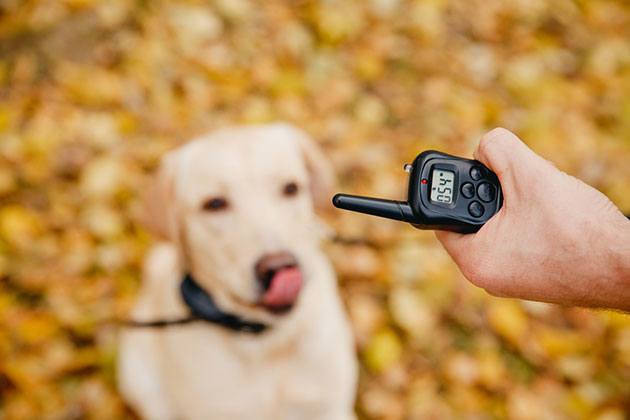
An electric wire dog fences are an excellent choice for owners who don’t want to ruin their yard aesthetically.
With electric fences, you have plenty of options. You can go with a temporary electric fence, in-ground fencing, or above-ground fencing.
One of the reasons why so many canine owners opt for an electric fence is that it does not have a typical cost of a traditional dog fence.
However, owners’ common types are invisible dog fences and wireless fences.
With an invisible fence, your dog can enjoy the free runs in the yard but only to a specific limit.
These fences include a collar that lets off static correction warnings when the dog crosses or comes near the boundary line.
Wireless fences are the easiest ones to install, but they are only around 70% effective.
Furthermore, since they rely on wireless signals, the system can be interrupted often and lead to unstable connection, therefore lacking safety.
They are pretty similar to the invisible fence, but this one does not feature any wires for the installation.
The no-wire fencing design is not the best for privacy.
Pros:
- Electric fencing can keep the pup contained in their territory. It does not let them wander off to the streets. The fence can teach the dog to respect boundaries, requiring low maintenance.
- Plus, it’s suitable for a small yard.
Cons:
- Now, while an electric fence effectively teaches your dog how to respect boundaries, it may not be the best fence choice in the long run. When dogs are exposed to this type of fencing, it could lead to negative behavior.
- Your dog will potentially start to dread the environment around him and fear the outside of the fence. Therefore, we recommend electric fencing for dogs only to the fully trained ones.
If you can find a dog fence alternative to electric ones, we highly suggest you do, especially if your dog is not trained.
Electric fences do not encourage positive reinforcement so they can lead to behavior issues in the long run
2. Solid Barrier Fences
Solid barrier fences include metal fences, wood fences, vinyl, and other solid materials.
It’s terrific in offering a durable and sturdy construction you can design however you wish.
However, a common problem with solid barrier fences is that they can sometimes not be dog-friendly.
For example, if you built a fence to block the entire neighborhood, your pup will most likely not enjoy the new surroundings.
a. Wooden fence

A wooden fence is made from tall and full slate boards. They are best used for larger dogs who have trouble respecting the height of the fence.
Since they usually are built at six feet height, your four-legged mischief will not cause any problems.
Pros:
- A wooden fence is excellent for escape artists who often jump over the fence. Additionally, it’s a great privacy fence for small children and families.
Cons:
- However, the only downside of a wooden fence is the cost. They are much more expensive than other fences as they require frequent maintenance.
b. Metal Fences
Metal fences are one of the toughest and most durable dogs fence ideas you can develop! They keep the dog safe with sturdy construction that does not break easily.
A metal fence can be made from iron or aluminum.
Due to their aesthetics, owners usually pick them to enrich the exterior of their yard. However, you will have to be careful about the gaps in the dog fence.
If you have small dogs that can easily crawl out, make sure the bars are closer together.
Pros:
- Durable built that lasts for a long time and is aesthetically pleasing
- It offers better privacy for the entire yard and the fenced-in area.
Cons:
- You need to be careful with installation, especially if you have a small dog
- Pricy
- Requires installation effort
- Can develop rust over time
3. Chain Link Fences
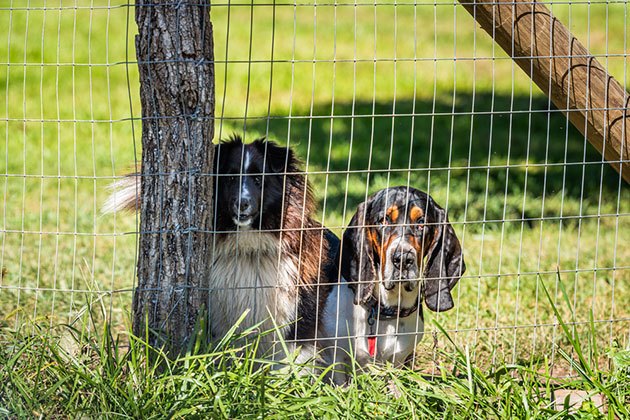
Chain link fences are among the popular dog fences.
The affordable option is a favorite of the majority of dog owners. A chain-link fence has all the benefits of solid fences but at a lower cost and less maintenance!
The chain-link fence consists of thick gauge wire mesh spread on the metal posts. You can install them yourself or call for professional installation!
However, a chain-link fence does have its list of pros and cons.
Pros:
- Durability as solid fences
- Excellent for smaller yards that don’t want to compromise space
- An affordable option for owners that want to save up
- It offers a curb appeal
- It can be designed as a tall fence
- Minimal to no maintenance
Cons:
- Installing a chain link fence means you lose all of the privacy of the rest of the neighborhood.
- It’s not portable, so you will have to come up with a permanent installation solution
- The chain link wire fencing allows most dogs to start digging beneath the fence
4. GPS Fence
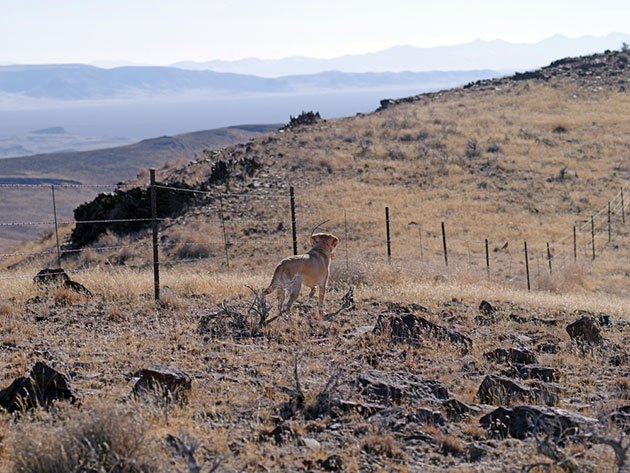
A GPS dog fence is a completely genius solution!
It’s suitable for large dogs and smaller ones and all terrains. Oh, and it’s cost-effective! How amazing is that?
Pet lovers can set up the barrier with GPS dog fences wherever they want! Fencing like this allows your canine to enjoy the nature around him without feeling confined.
It’s an excellent alternative to solid barriers. A virtual GPS dog fence connects to the dog’s collar using GPS signals.
The system warns your pup whenever he gets too close to the boundary line and lets off a signal.
This type of dog fence is excellent for owners who tend to move a lot of travel with their four-legged companions.
Pros:
- Works without challenging installation
- Ensures dog freedom within the boundary line
- Suitable for owners who travel a lot
- Great for all breeds
- No maintenance compared to other fencing options
Cons:
- The training with a GPS fence may lead to unwanted dog behavior
- It’s not suitable for indoor use
- There is no privacy in the neighborhood
- Does not stop other animals and predators from crossing the pet-fence
5. Indoor Dog Fence
Owners of smaller dogs often consider indoor fences.
However, not many canines will require an outdoor fence. Therefore, if your pup is considered to spend most of its time indoors, you might think of this fence.
It’s about half the cost then outdoor fences and is easy to install while accommodating every space!
But, if you tend to travel a lot and move, you are also a perfect candidate for an indoor dog fence!
With an indoor dog fence, your pup will not require excessive training.
In addition, an indoor dog fence will block out any forbidden areas for your pup at home.
For instance, you can install them in the kitchen doorway, so your pup does not sneak in and steal the breakfast leftovers.
Pros:
- An excellent choice for indoor dogs
- Easy to install in every area
- One of the best outdoor dog fence alternatives
- No maintenance
Cons:
- Not so suitable for a large dog as he can quickly jump over the wooden posts
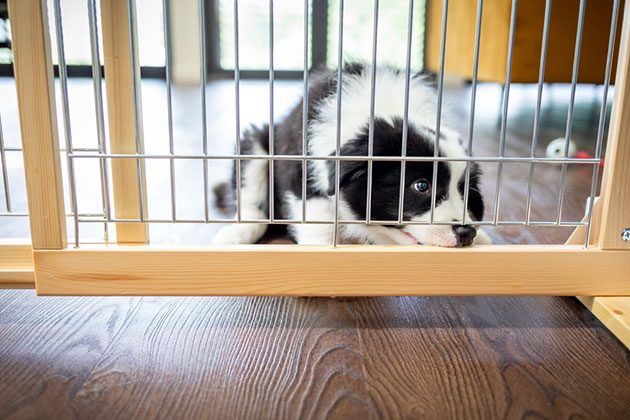
6. Picket Fence
A picket fence is a tall fence usually made from wood. These wood fences are cost-friendly, so they will not require your yearly savings to be installed!
However, a picket fence is not suitable for certain dog breeds.
The stronger ones can easily break their way out of a picket fence. It will also not contain other smaller animals and can crawl under the wood fence.
Pros:
- Spaced out vertical slats allow the dog to see into the yard
- It can be designed as a tall fence
- Budget-friendly
- Usually made from wood which makes it durable
Cons:
- Not suitable for small dogs or aggressive breeds
- It does not stop other animals that can crawl under the fence
7. Snow Fence
Owners who don’t want the additional cost of chain link fences may opt for a snow fence instead.
This type of dog fence is made from wire mesh that links joined together at the intersection.
However, this dog fence is not nearly as durable as a chain-link fence.
Although it can keep a small dog from poking his nose or paws out of the fence, we would still recommend it as a temporary fencing solution.
Although they are cheap, they will require heavy maintenance.
Pros:
- Cheap and easy to post up
- Great for pet owners who are looking for a versatile fencing solution
- Suitable for smaller dogs
Cons:
- Not great for aggressive dogs
- Not so durable
- Requires maintenance
8. Split Rail Fences
There is quite a controversy when it comes to split rail fences.
First, the fenced-in yard is still visible from the other side, so it only partially covers the privacy.
On the other side, they are not as aesthetically pleasing and can be pretty costly. Also, it will not stop other dogs and animals from digging underneath the fence.
Pros:
- Partial privacy for both the owner and the dog
- Easy to install
- Curb appeal
Cons:
- Not effective in stopping dogs and other animals from digging under the fence
9. Brick Fences
Brick fences completely block out the few. This is one of the best privacy fence types, but it does have its disadvantages, especially on the well-being of the doggo!
Since they cannot see past the barrier, this may result in depressive behavior.
However, the dog fence is excellent for diggers and aggressive dogs.
A high jumper like Australian Shepard will have trouble executing the jumping trick they are known for!
Pros:
- Highly durable
- Best fence for high jumpers as well as aggressive dogs
- Best privacy fence
- Keeps the pet safe from intruders and predators
Cons:
- Blocks the view
- Expensive to built
10. Stone Fences
A stone dog fence is similar to a brick one. This type of dog fence can be pretty decorative if done with style.
But, logically, it will cost more.
But, if you live in a homeowner’s association neighborhood, you will have to check the regulations on the height allowed.
A stone dog fence is set deep in the ground, so it’s terrific for diggers!
Pros:
- Stylish
- Excellent for diggers
Cons:
- Expensive
FAQs
What type of fence is cheapest for dogs?
The cheapest dog fence is a chain fence. It can also end up being a fun DIY weekend project if you want to reduce professional installation costs.
PVC fences are also considered cheap, but they are not so durable for a large dog.
How tall should a fence be for a dog?
Measure your canine at the shoulder height. Then, take these measurements and multiply them by three. This will result in the appropriate size for a dog fence.
For instance, a German Shepherd is around 26 inches tall, so the fence must be approximately 6 feet high.
For a smaller dog, a 4 feet fence will be enough.
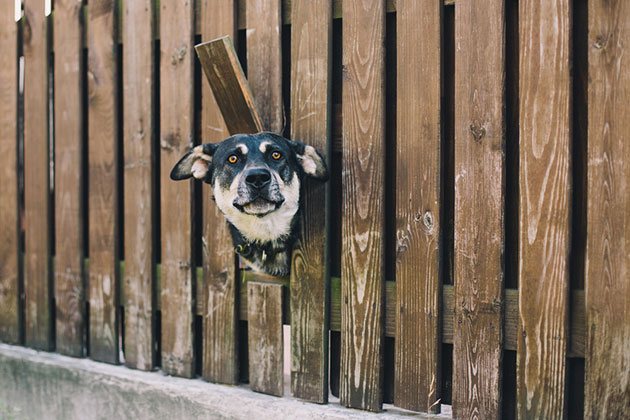
Are GPS dog fences effective?
Yes, GPS dog fences are effective but only to a certain point.
They are not always accurate, and once a dog crosses the 30 feet limit, the signal will no longer be clear.
They are also not suitable for neighborhoods with heavy traffic. Training is required, and a GPS fence is ineffective for dogs with no training whatsoever!
What is a good size fenced-in yard for dogs?
For most breeds, a 5 feet dog fence with around 200 meters of linear foot is suitable. However, this all depends on your yard size and your dog’s needs and behavior.
If your canine is a high jumper, you will need a taller fence than this.
Also, if your pup is a digger and an escape artist, the fence will need to be set deep into the ground.
What is the most durable fence for dogs?
A vinyl fence is considered to be the most durable for dogs. It’s excellent for high jumpers as well as for smaller breeds.
However, you may also opt for a brick or stone fence.
These types are not easily destroyed by environmental impacts such as unpredictable weather. They also require minimal maintenance.
Can you use an electric dog fence inside?
It’s not recommended to use an electric dog fence indoors.
Since indoor fences are usually installed on the doorways, this could easily give the owner or children a mild shock when passing by.
Instead, keep the electric fence outside and hang warning flags on the wire.
Conclusion
These are all of the types of dog fences you can consider!
Lastly, the best dog fences are the ones that accommodate your yard size, dog’s temperament, and budget.
Don’t think of a dog fence as a way to offer a physical barrier for your pup.
Instead, a fence is a terrific addition to keep your pup safe in the territory and prevent other animals from entering the yard perimeter.
If you are still unsure of all these dog fence ideas about what dog fence you should choose, it’s best to contact a local dog trainer.
Consult with them to see which one of these dog fence ideas works the best with your dog’s behavior!
Training is an inevitable part of dog fences, so keep comfort and discipline a priority.
